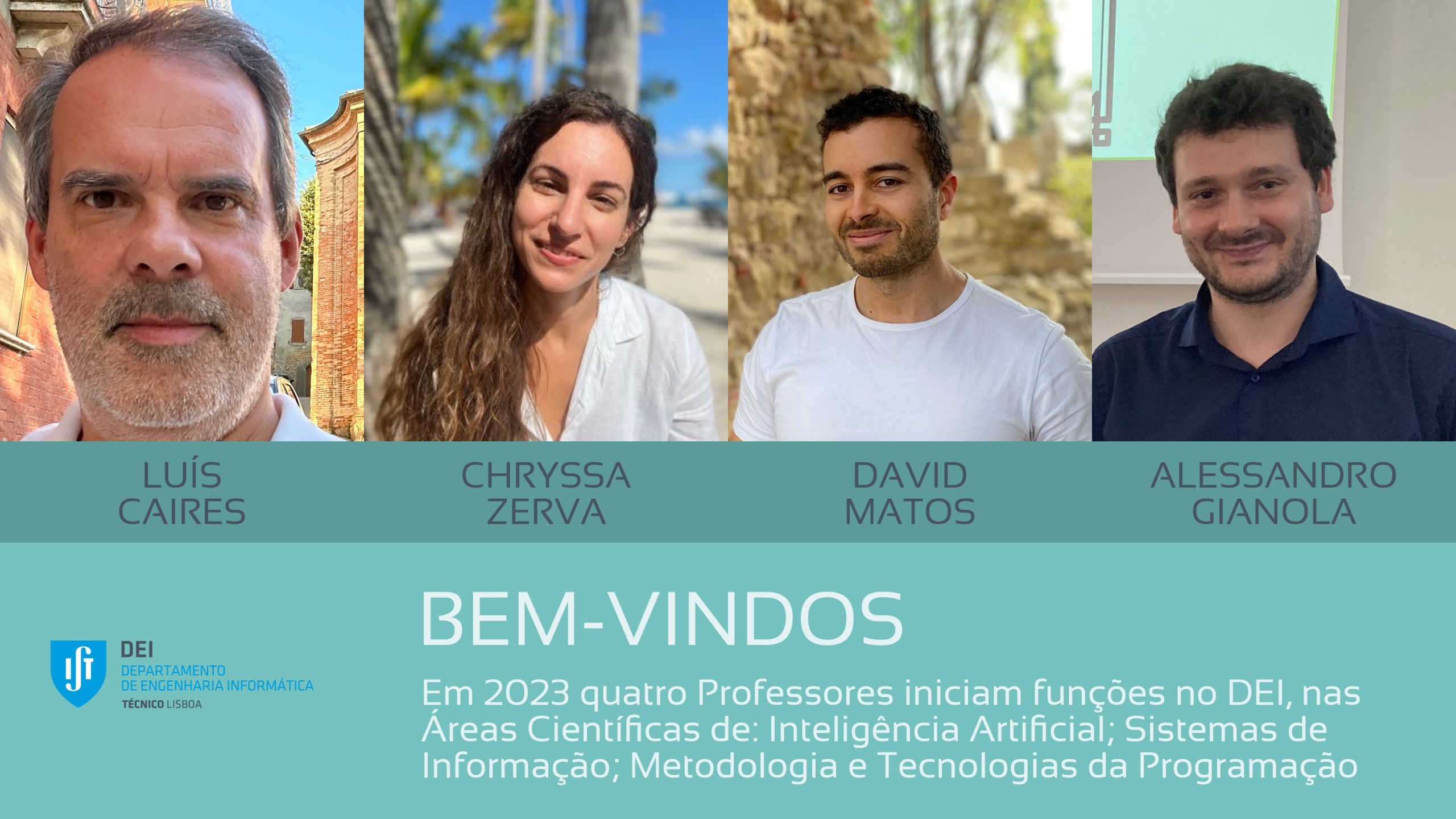New Professors of DEI 2023/2024

In the upcoming academic year, the DEI has four new professors. Shall we get to know them a little better?
David R. Matos has a BSc and a MSc in Informatics Engineering from Faculdade de Ciências - UL and a PhD in Computer Sciences and Engineering from Instituto Superior Técnico. He has worked as a researcher at the Distributes, Parallel and Secure Systems Group (DPSS) at INESC-ID and at LaSIGE. He has been involved in several projects, including SafeCloud, SEAL and BIG ERA Chair. His research interests are related to Distributed Systems, Cybersecurity and Cloud Computing.
Alessandro Gianola joins the Computer Science and Engineering Department of the Instituto Superior Técnico as Assistant Professor in Information System after a Postdoc position at the Free University of Bozen-Bolzano (Italy). He works on formal methods, and Business Process Management (BPM), using logic for verifying complex processes enriched with data. He has co-authored more than 40 refereed publications, including articles in top-tier journals such as the Journal of Automated Reasoning, Information Systems and ACM Transactions on Computational Logic, and conference papers at AAAI, IJCAI, BPM, IJCAR, and CADE. He is recipient of two best paper awards (PRIMA 2020 and BPM 2021). His PhD dissertation won three prestigious awards: the 2022 Best Italian PhD Thesis in Theoretical Computer Science Award, the 2022 Best BPM Dissertation Award given by the BPM Association, and the 2023 CADE Bill McCune PhD Award in Automated Reasoning given by CADE Inc.
Luís Caires is a Full Professor in the Department of Computer Science and Engineering at Instituto Superior Técnico, a Researcher at INESC-ID, and holds the position of European Research Area Chair within the framework of the BIG Project. His research and teaching are centered around programming languages and models, computer security, and the fundamentals of computation. He has contributed impactful scientific work and numerous seminal work in these fields, and he also maintains an interest in the social aspects of technologies. He is an elected member of the IFIP Working Group 2.2 on Programming Concepts, serves as the President of the Coordinating Committee for the European Symposium on Programming Languages and Systems, holds the position of Vice-President of the Portuguese Society of Logic, and acts as the Scientific Director of the CMU|Portugal Program. Previously, he held positions as Assistant Professor, Associate Professor, and Full Professor in the Department of Computer Science at NOVA University Lisbon, where he served as Department Chair and founding Director of the NOVA Laboratory for Computer Science and Informatics. At FCT NOVA, he also served as the General Coordinator of R&D Units, a member of the Scientific Council, and a member of the Faculty Council.
Chrysoula (Chryssa) Zerva joined the Department of Computer Science and Engineering at Instituto Superior Tecnico in Aug 2023 as an assistant professor in Artificial Intelligence. She obtained her Ph.D. in 2019 from the University of Manchester working on "Automated identification of textual uncertainty" under the supervision of Prof. Sophia Ananiadou. She was subsequently awarded the EPSRC doctoral prize fellowship for the "Fake Health News'' project, to study information propagation and detection. In 2021 she joined Instituto de Telecomunicações in Lisbon, as a post-doc for the DeepSPIN project, under the supervision of Prof André Martins and she worked on a range of NLP related topics including uncertainty, machine translation and evaluation. She also recently joined LUMLIS, the Lisbon ELLIS unit. She is very intrigued by the concept of uncertainty: how can we quantify it, communicate and reason about it. She is also very interested in topics that relate to evaluation, bias and ethics in machine learning and natural language processing. Beyond core research, she is also interested in the dissemination of science to the public and keen on promoting women's participation in research and science; she was involved in events such as the Pint of Science, Women in Localisation and Greek Girls Code.
